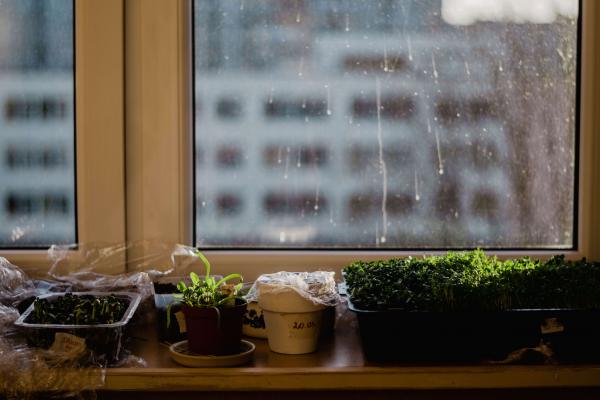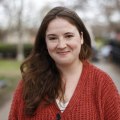Lately, I have been checking on my broccoli seedlings with a near-maternal compulsion. Much of my 75-square-foot back patio is covered in the shade of trees and other brownstones, so every hour of daylight, I move my broccoli pots a couple feet to catch a new pocket of sun. In this year of so much dying, I urgently need to see something grow.
I often struggle with certain names for Jesus — Lamb of God, Master, King of Kings — but I’ve never had a problem with capital-G Gardener. It’s comforting (and a bit amusing) to imagine God in the weeds, holding a watering can, picking me up to place me in a new pocket of sunlight. That’s probably why I keep re-reading “The Dryad of Gethsemane Speaks to Mary Magdalene on the Evening of Holy Saturday.” In this poem by Holly Wells, a nymph passes along a little encouragement to the person who will go on to be the first one to spread the good news: “You will see, / and you will not be wrong / when you call Him Gardener.”
Depending on how you look at it, I am either several months too early or several months too late to be reading poetry about Easter weekend. But I don’t care. Given how much COVID-19 has disrupted our lives, I don’t think the Gardener will mind if I shake up the lectionary a bit. Below you’ll find Wells’ poem and nine other stories our editors have been reading this week:
1. Who Gets a Vote in God’s Beloved Community?
The world system we've created devalues immigrant lives. This election is a prime example. By Sandy Ovalle via sojo.net.
2. When What Parents Are Feeling Is More Than Just Stress
Paying attention to symptoms like headaches, dizziness and fatigue is crucial, now more than ever. By Sandi Villarreal via The New York Times.
3. Can Greensboro Model a National Peace and Reconciliation Process?
After 41 years, Greensboro has apologized for a dark day in 1979 when police allowed Klan members and neo-Nazis to kill local activists. By Jordan Green via sojo.net.
The ofrenda we build to honor loved ones will include not only our distant past but also the very sorrow that we’re living through now. By Oscar Casares via Texas Monthly.
5. Why I Can’t Write About Aesthetics Right Now
“If we cannot even look at a video of a Black individual being murdered and see the same thing, how can we begin to talk about what cultural production may add to the conversation?” By Faith-Marie Zamblé via Sojourners.
6. Amy Coney Barrett’s Nomination Fight Leaves Progressive Catholics Feeling Unseen
“Characterizing those who are anti-LGBTQ, against abortion and who lean conservative as the definition of Catholicism … promotes a model of Catholicism that is largely white and excludes Black, Latino, Asian American and other ‘minoritized’ Catholic communities in the U.S.” By Alejandra Molina via RNS.
7. “The Dryad of Gethsemane Speaks to Mary Magdalene on the Evening of Holy Saturday”
“Look up, look up, look up. / From seeds swallowed dead, trees rise holy. / Roots reach deep and branches high.” By Holly Wells via Sojourners.
8. Jesus Christ, Superspreader?
“A conservative Christian preacher promised to bring ‘salvations, signs and wonders, and miracles’ to Nashville on Sunday night when he hosted a mass religious gathering in the city’s Public Square Park downtown. The real miracle, however, will be if no one catches the coronavirus.” By Joseph Hudak via Rolling Stone.
9. In Civil Unrest, How Do We Keep Each Other Safe?
“People are still people; we still need to eat, we still need to feel safe in our homes, we still need to talk to our neighbors—how do we maintain that as much as possible in a time of anxiety?” By Betsy Shirley via Sojourners.
10. How a Virus Surge Among Orthodox Jews Became a Crisis for New York
“Hasidic neighborhoods may be particularly susceptible to virus misinformation because people tend to avoid the internet, and few families own televisions. Many get their news from conservative talk radio, Yiddish publications with an often conservative bent or memes shared via WhatsApp.” By Liam Stack and Joseph Goldstein via The New York Times.
Got something to say about what you're reading? We value your feedback!

